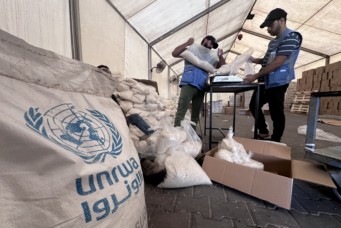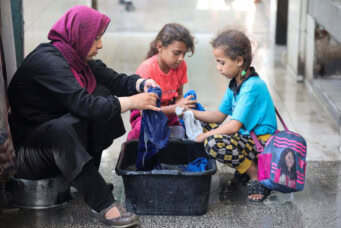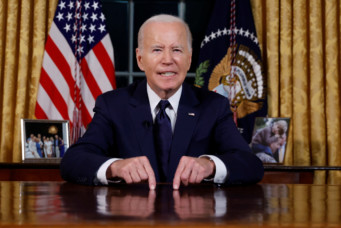In Targeting UNRWA, Israel Aims to Destroy the Right of Return
Hoping to capitalize on world sympathy after October 7, Israel tried to use its allies to defund and dismantle the UN relief agency.

A woman carries belongings on her head, as Palestinians inspect the damage after Israeli forces withdrew from Jabalia refugee camp, following a raid, in the northern Gaza Strip, May 31, 2024. REUTERS/Mahmoud Issa.
Israel has been pursuing a war of revenge against Gaza for the October 7 cross-border attack by Hamas fighters that left 1,200 Israelis killed, and hundreds of civilians and soldiers captured or taken hostage.
But world sympathy for Israel quickly dried up as the media showed the horrific images of Palestinian civilians, mostly women and children, killed by Israeli military strikes on refugee shelters and health care facilities in the days and weeks after October 7.
With the Palestinian death toll nearing 40,000, and the Israeli government shrugging off demands even from its allies to agree a ceasefire, global public opinion shifted to one in solidarity with Gaza.
An almost universal call for a ceasefire brought out hundreds of thousands of protestors in major cities across the globe. Numerous global agencies and public figures proclaimed that the carnage wrought on Gaza by the Israeli military was indeed a genocide.
As voices—including those of Western leaders—condemning Israel grew louder, Israeli officials had to do something. They wanted to score a political victory that could help remove from the international horizon a major international agency that had come to symbolize the central Palestinian cause: the right to return to their homeland.
A turning point came in late January when South African lawyers at the International Court of Justice (ICJ) in the Hague prepared their case accusing Israel of genocide against the Palestinian people in Gaza.
But even as opening arguments and evidence of genocide were presented at the ICJ, the Israeli government and its foreign supporters were conducting a synchronized campaign to discredit and demobilize an important United Nations agency.
With no evidence but plenty of media fanfare, Israel accused twelve Palestinian employees of the United Nations Relief and Works Agency for Palestine Refugees in the Near East (UNRWA) of having been accomplices in the October 7 Hamas cross-border attack.
Despite having no evidence to share with the global community, Israel called on its allies in the West to stop or at least suspend funding UNRWA after what it said was irrefutable proof of the employees’ involvement in October 7.
Before UNRWA could respond to Israel’s accusations, almost all major Western donors toed the line and followed Washington’s lead to suspend its funding immediately.
The fact that Israel is known to use heavy-handed detention and imprisonment practices—and according to Israeli human rights group B’Tselem, has used torture to extract confessions—did little to give pause to it’s Western supporters who quickly called for dismantling UNRWA for fear they would be perceived as aiding terrorism and supporting antisemitism.
UNRWA officials demanded proof, but Israel has at the time of writing failed to produce any.
The Israeli gambit against UNRWA fell into shambles.
Within weeks of Tel Aviv making public its allegations against UNRWA, some Western donors—many considered to be stalwart Israel allies like Canada and Germany—resumed their donations to the beleaguered relief agency.
Despite this, the United States and United Kingdom have not resumed funding, with the former suspending funding for the agency until at least March 2025.
It is not surprising that Israel would attempt to destroy UNRWA at a time when its brutality in Gaza was coming under public scrutiny and condemnation around the world, with even erstwhile supporters demanding it agree to a ceasefire.
Israel has for years targeted UNRWA because the central premise of the relief agency’s mandate is the return of Palestinian refugees to their ancestral homeland, a nightmare scenario for hardline officials like Prime Minister Benjamin Netanyahu.
From Return to Resettlement
Seventy-five years earlier, when the state of Israel was born, Palestinians were ethnically cleansed by Israeli militias and armed groups from hundreds of villages and towns. More than 750,000 Palestinians who were living in what Israel declared to be its state on May 15, 1948, became refugees overnight. These sudden refugees who were forcibly displaced as they fled the brutality of Zionist armed attacks and massacres, flooded the nearby areas of the West Bank (which would later be annexed to Jordan) and the Gaza Strip (which was administered by Egypt). They also managed to find refuge in Lebanon, Syria, Egypt, and areas in the east bank of the Jordan river. Palestinians who were living in the center and southern areas of historic Palestine crowded into the seaside strip of Gaza. In time, those refugees would become the majority of its population who today are yet again forced out of their homes.
Unused land plots were given to the temporary refugees, unknown to them or local governments that this was no temporary status but would become a decades-long housing problem. Unable to return after the war as a result of the new state of Israel’s refusal to allow them back home, the refugees lived in tents and later corrugated iron-roofed shanty homes usually in an exceedingly small geographic area.
Images of Palestinian refugees in the first winter of 1948 and subsequent years would be shown around the world prompting the United Nations to move quickly to address this humanitarian crisis. The UN, which replaced the League of Nations, was intent on a new post-World War II order in which the emerging powers, led by the United States, would not tolerate such mass deportation of a civilian population—reminiscent of European ethnic cleansing. The United States, which was the first country to recognize Israel, was caught in a bind.
As the chair of the UN Conciliation Commission for Palestine (UNCCP), the United States realized that Israel would never allow the refugees back to their homes. It looked for an alternative to the right of return in the form of local integration in host countries where the Palestinians had become refugees. The scheme for this, modeled on the Tennessee Valley Authority, became UNRWA.
The “Works” in UNRWA’s name refers to large-scale and labor-intensive public work schemes envisaged to economically integrate the refugees in the host countries. In this sense, UNRWA was born with ‘original sin’ because it changed the direction of the pursuit of a solution to the refugee question from return, as per United Nations General Assembly (UNGA) resolution 194, to tawteen (resettlement) just 12 months later.
Created by the UNGA resolution as a temporary agency, UNRWA had no set budget from the United Nations, and its mandate, renewed regularly, set the parameters for its operations.
The Americans and their Western allies decided to fund this new agency while hoping that its mandate would be short-lived. Payment for UNRWA’s commissioner and senior managers came from the UN itself, but all other staff were paid largely from donor funding, making fundraising the priority for the agency’s top brass.
As it was expected to be a temporary organization until Israel agreed to the return of the refugees under UN Resolution 194, the agency was unable to work on a regular budget to be set beforehand.
UNRWA, which has had international (largely Western) directors-general ever since it launched operations in 1950, began the effort of organizing housing, medical support, elementary education, and vocational training for the refugees. The new agency made agreements with local authorities from Jordan, Egypt, Syria, and Lebanon to fulfill its mission.
As a relief and works agency, UNRWA gave priority to Palestinian refugees themselves to work in its clinics, schools, and vocational training centers. Registered Palestinian refugees used their UNRWA registration cards at food centers and medical clinics, as well as local UNRWA schools.
The Nakba and Right of Return
The 1967 War represented another chapter in the continuing misery of Palestinian refugees, and UNRWA’s evolution in hopes of alleviating their plight.
While most of the Palestinian refugees had lost their homes and land in what is now called the 1948 Nakba (the catastrophe), a new batch of refugees was created as the Israeli military rolled into Gaza and the West Bank in the June 1967 War, called the Naksa (defeat).
While many—especially in the Jordan Valley area camps were already refugees who had been pushed out during the 1948 War to the safer east bank of the Jordan River, now the Hashemite Kingdom of Jordan—the dramatic defeat of Arab armies ceding land to Israel created a new wave of first-time refugees.
Palestinians in the West Bank, whether refugees or not, as well as in the East Bank, were all given Jordanian citizenship as part of the annexation of the former to Jordan following the Nakba.
Israel explicitly requested UNRWA to continue its operations in Gaza and the West Bank during the 1967 War and an exchange of letters was agreed in a matter of days.
While Israel as an occupying power did not have the right to ban the UN agency from working in areas under its control, the relationship was not always pleasant; for the most part Israel tolerated its existence. In fact, in its years of direct occupation of Palestine, Israel was happy that UNRWA relieved it of the duties and costs of providing medical, educational, and other support that normally would be the responsibility of the governing occupier.
For UNRWA—like its sister agency, UNHCR—its mandate neither made distinction between first-generation refugees or their children, nor did it care if they had received citizenship in other countries or not. As long as they were refugees or descendants of refugees, they were allowed to register with the UN agency and benefit from its services.
But history shows that Israel never had any intention to allow the refugees to return. The UNCCP, which met and organized several conferences to try and resolve the issue, failed in the face of Israeli intransigence, which was often coached with unrealistic excuses. When Israel applied for membership to the UN, the international agency pushed Israel to fulfill the relevant UN resolutions and Israel promised but never fulfilled nor did it ever plan to fulfill the right of Palestinians’ right to return.
Israel was the homeland of the ‘Jewish people’ and Jews from around the world had the right to settle in Palestine and occupied territories, as per the 1950 Israeli Law of Return, Israel argued. It used that as a pretext to declare that the return of Palestinian refugees would constitute the end of the Jewish state, and therefore it was unwilling to accept their return.
In the 75 years since the refugee crisis was created, the only serious talks about resolving the Palestinian refugee problem took place under former Prime Ministers Yitzhak Rabin and Ehud Barak. The first attempt at resolution was after the PLO and Israel exchanged letters of recognition and the Declaration of Principles was signed at the White House in 1993, while the second was during the short-lived Ehud Barak administration.
In those talks, the Israelis refused to allow wholesale the return of Palestinian refugees but were willing over a ten-year period to allow the return of 10,000 a year on the basis of family reunification only.
Rabin was assassinated by a radical right-wing Israeli settler and Barak would later lose the elections to his militant and hardline adversary, Ariel Sharon.
But decades after the Nakba, many Palestinian refugees were no longer interested in actually returning to their homes and lands that were now Israel. Rather, they insisted on preserving their right to return—a right stemming from the illegality of the ethnic cleansing of Palestine. Palestinian negotiators would demand from their Israeli counterparts an admission of Israel’s moral and historical role in causing the refugee problem.
The Far-Right’s Attacks on UNRWA
UNRWA has been a manifestation of the unresolved plight of the Palestinian refugees and, as such, is a nuisance to Israel.
The Israelis argued that under international law the status and therefore the rights of refugees do not pass to their descendants. Instead, Israel wanted to dismantle UNRWA and shift the responsibility of Palestinians to UNHCR which would automatically dilute the issue of the right of return. Although Israel has often criticized UNRWA, substantive efforts to neutralize it grew in tandem with the increasing prominence and power of the Israeli far right.
A concerted media and political campaign began to defame UNRWA because it hosted Palestinian refugees who made public expressions of their rights and lived in countries that spoke about the Nakba. Israel claimed UNRWA supported terrorism and hatred of Jews in school books used by children in refugee camps. The agency responded that the school books that were taught in various countries were the official curricula of those countries. Nevertheless, UNRWA wanted to debunk these accusations and began creating a human rights curriculum to be taught at all UNRWA schools.
Khalil El Halabi, a long-time UNRWA teacher and staffer, was proud to unveil the UNRWA human rights curriculum during a 2009 visit to Gaza by former U.S. President Jimmy Carter.
But the accusations and campaign to discredit UNRWA continued. Meanwhile, successive UNGA meetings repeatedly renewed its mandate.
As in many cases, Israel often creates momentum by making a preposterous claim that often includes an accusation of supporting terrorism, forcing many donors to suspend their support of Palestinians. By the time the truth finally came out, the damage had already been done. In recent years this is exactly what happened when Israel accused a Palestinian from Gaza, Mohammad El Halabi, director of World Vision, of diverting 50 million dollars of humanitarian aid to Hamas even though the entire budget of the aid agency does not even come to that.
Additionally, six Palestinian Human rights organizations were accused of being terrorist fronts. No evidence was presented by Israel in this issue as well. But in both cases as in the UNRWA issue, the goal was temporarily accomplished. World Visions suspended all its humanitarian support to Gaza to this day even though their own detailed and independent investigation proved that there was no wrongdoing. In the case of the six organizations, some donors hesitated but others have continued in their support—and the same has happened to UNRWA.
Achilles Heel
The absence of a systematic and transparent multi-year budget for its operations, which have become costlier with the growth of the refugee population, has in time emerged as UNRWA’s Achilles Heel.
Arab donors continue to hesitate in supporting UNRWA funding—especially after major Israeli attacks on refugee camps in Lebanon, Syria, the West Bank, and Gaza—except in emergencies.
Gulf countries helped rebuild the Nahar al Bard camp in Lebanon, the Yarmouk Camp in Syria, Jenin camp in the West Bank, and numerous UNRWA refugee camps in Gaza, but did not increase contributions to the agency’s regular operating budget.
Under former U.S. President Donald Trump, Israel succeeded in getting Washington to defund UNRWA, though other countries, especially Scandinavian and some Arab countries, stepped up. The Biden Administration renewed funding when he became president, but is in large part responsible for UNRWA’s current funding crisis.
Today, the agency is threatened by more than just an assault on its finances; Israel has ordered UNRWA to evacuate its premises in East Jerusalem due to ‘unpaid rent’. And the Israeli parliament is considering designating the agency as a terrorist organization.
What is clear is that despite the numerous and repeated cases of fabrications, lies, and distortions by Israel, many in the West continue to believe the Israelis. And when they don’t, they fear not appearing to believe them and therefore suffering from the entitled indignation of Israel and its supporters—accused of being accomplices to terror and supporters of antisemitism.




